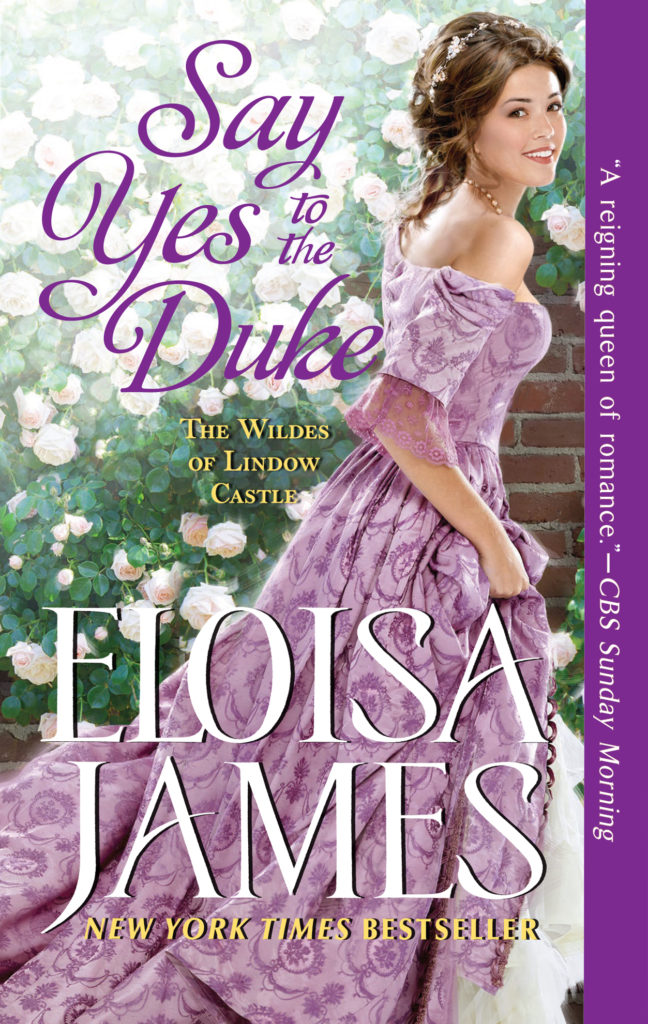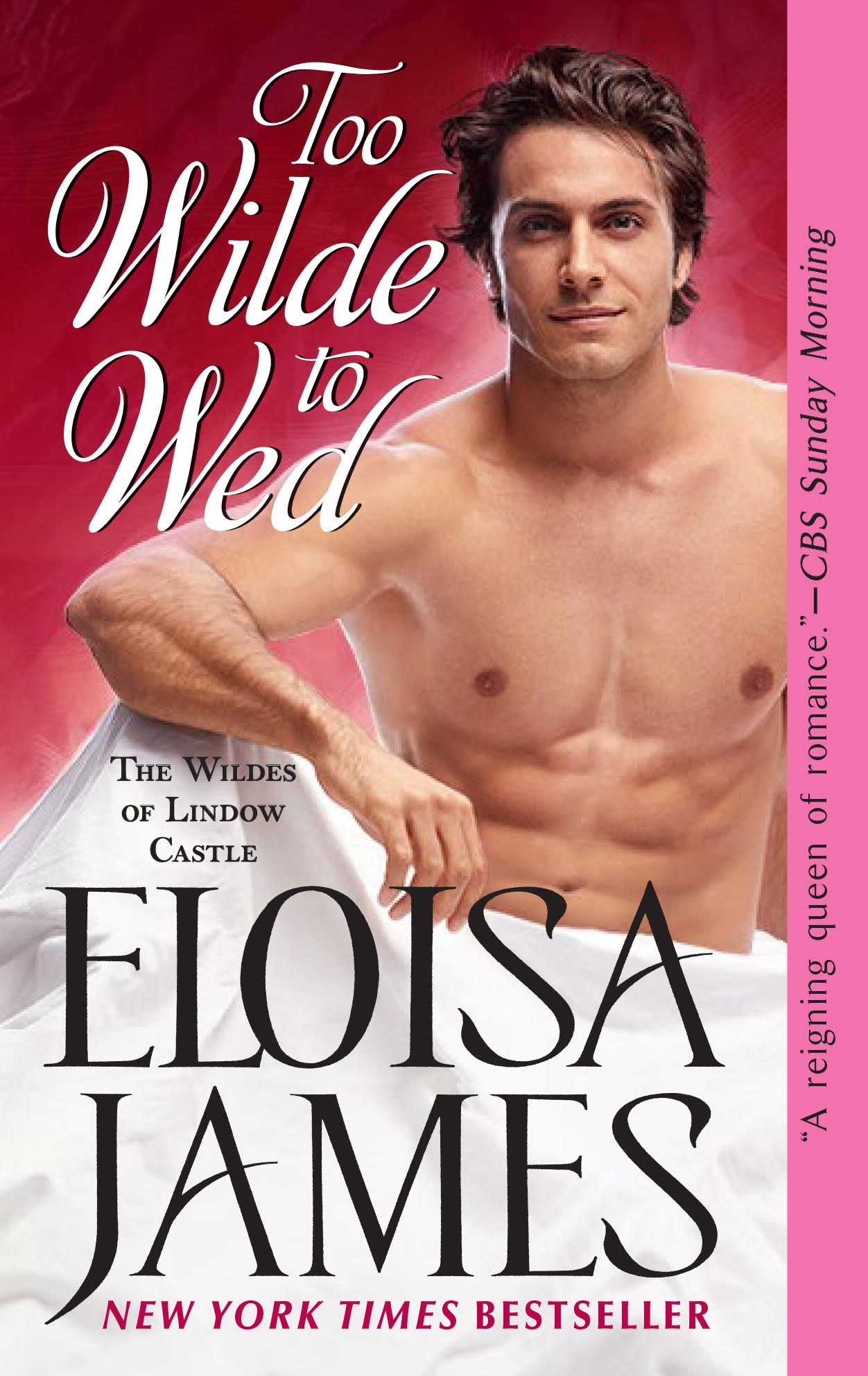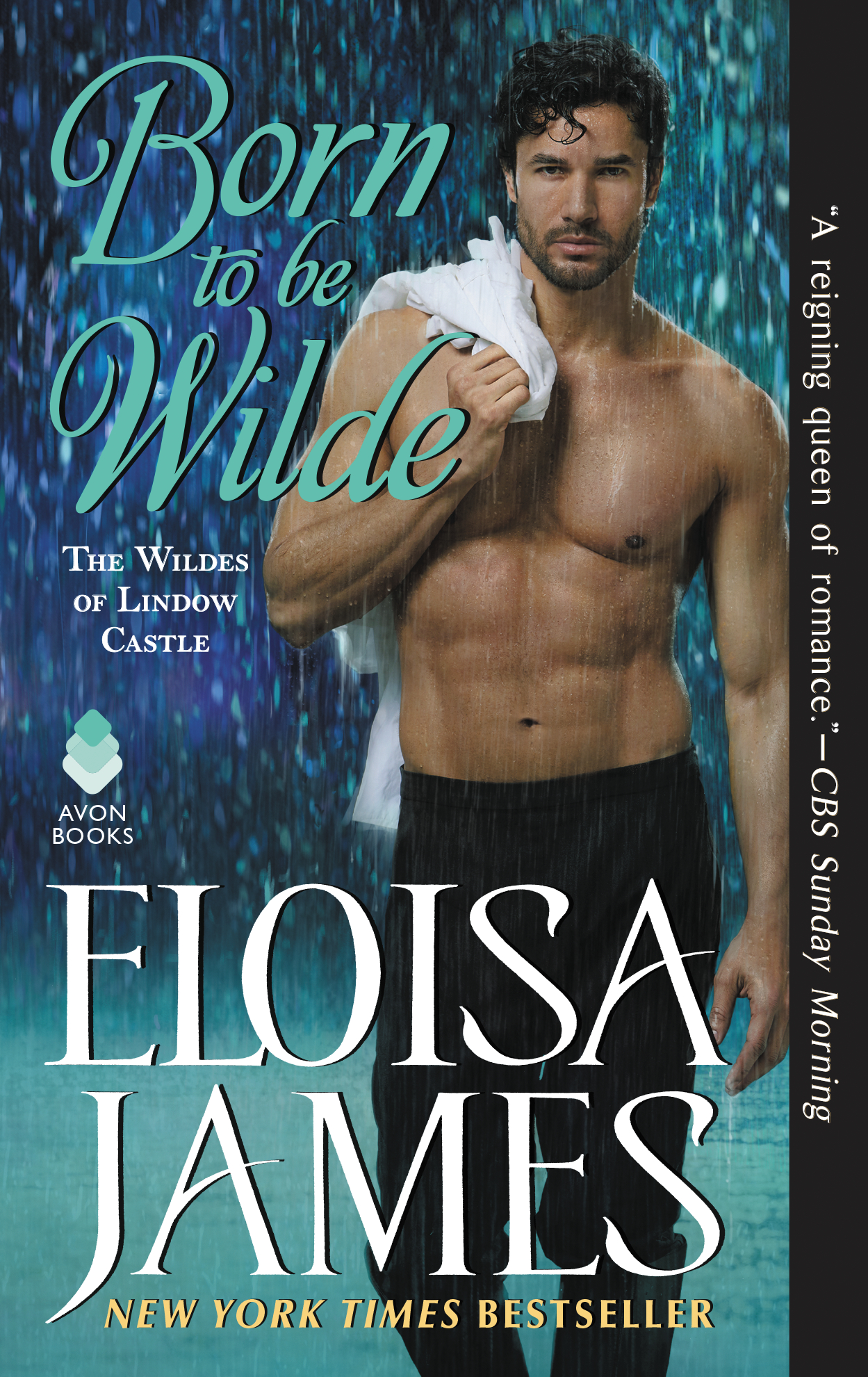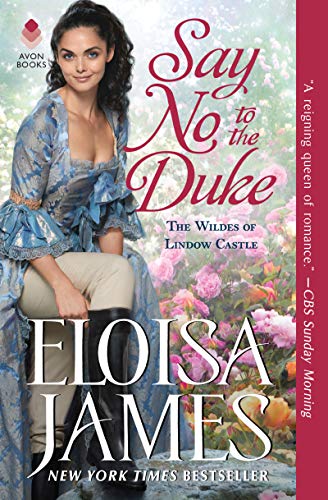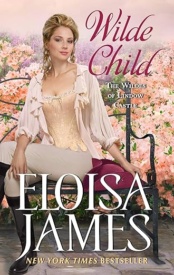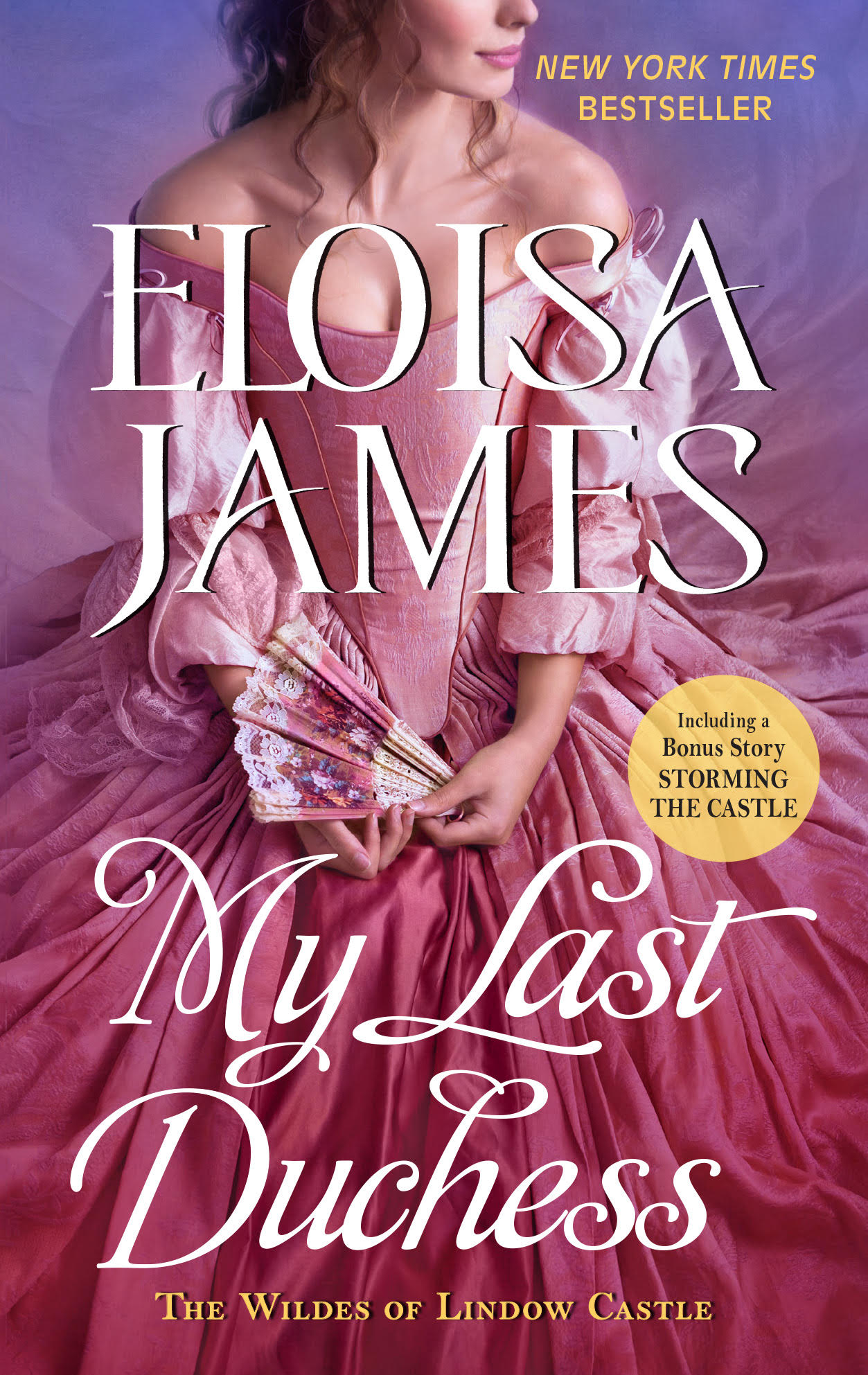Say Yes to the Duke
Book 5 in the Wildes of Lindow Castle Series
Miss Viola Astley is so painfully shy that she’s horrified by the mere idea of dancing with a stranger; her upcoming London debut feels like a nightmare.
So she’s overjoyed to meet handsome, quiet vicar with no interest in polite society — but just when she catches his attention, her reputation is compromised by a duke.
Devin Lucas Augustus Elstan, Duke of Wynter, will stop at nothing to marry Viola, including marrying a woman whom he believes to be in love with another man.
A vicar, no less.
Devin knows he’s no saint, but he’s used to conquest, and he’s determined to win Viola’s heart.
Viola has already said Yes to his proposal, but now he wants her unruly heart…and he won’t accept No for an answer.

Say Yes to the Duke
Book Extras

Eloisa & Lisa Kleypas in Conversation: Why We Love Wallflowers in Romance
Eloisa and Lisa talk about wallflowers in historical romance.

Inside Say Yes to the Duke
The backbone of Say Yes springs from unhappy memories of middle school: I was miserably convinced that I was deeply unattractive and would never fit in anywhere.

Eloisa Reads from Say Yes to the Duke
Join Eloisa from her cozy apartment as she reads from the very beginning of Say Yes to the Duke.

An intimate interview with Eloisa
Eloisa chats with Megan Corbett from Frolic in this video interview.

The Wilde Family Tree
Learn who’s who in the Wilde Family.
A Viola Paper Doll
Eloisa chose this reader-submitted paper doll for Viola, her heroine from Say Yes to the Duke.

Mea Culpa, Say Yes to the Duke
Alaric is mistakenly referred to as the eldest Wilde in Chapter One. (I corrected on the proofs, but it made went the book anyway.) On page two: “The oldest Wilde, Alaric…” should read “Her older half-brother Alaric….”

Say Yes to the Duke
Reviews
"...best-selling James comes through with another heartfelt, sensuous entry in the Wilde family saga."
— Library Journal
"Once again, James expertly calibrates the perfect ratio of exuberant wit to elegant sensuality, and the end result is a romance worth celebrating."
— Booklist, Starred Review
Say Yes to the Duke
Enjoy an Excerpt
Jump to Ordering Options ↓
Listen to an Audio Excerpt ↓
Chapter One
- Jump to:
- Chapter Two
- Chapter Three
- Chapter Four
Lindow Castle, Cheshire
County Seat of the Duke of Lindow
November 15, 1781
Miss Viola Astley, the stepdaughter of Hugo Wilde, Duke of Lindow, considered it the greatest misfortune of her life that she was the complete opposite of a Wilde.
She had realized as a child that she had no more in common with His Grace’s offspring than a donkey to a dragon. As her mother, Ophelia, had married the duke when Viola was only two years old, her earliest memories were defined by feeling not Wilde.
Her half sister Artemisia, for example, was beautiful, bold, and audacious.
At the age of six!
Whereas Viola was timid, tongue-tied, and fairly useless.
Her older stepsister Betsy was famous in the family for being able to shoot arrows from horseback; Viola was afraid of horses, and didn’t care for arrows either. Fear itself marked her as not a real Wilde.
Courage was a hallmark of the duke’s other children. Her stepbrother Alaric was a writer who wandered about foreign countries with his wife and children, fearlessly doing fearless things. Joan, whom Viola loved most of all, relished being in public, to the point of pining for a career on the London stage. And after Betsy put aside her bow and arrows, she triumphed in London society, rejecting nineteen suitors before marrying a future marquess.
Whereas Viola went to her first ball at the age of fifteen and disgraced herself by throwing up just outside the ballroom. Even worse, after that she lost what little courage she had. These days she could scarcely sit beside a strange gentleman without her stomach twisting into a knot.
No matter how many times her family reassured her that there was nothing to worry about, she didn’t seem to be able to overcome the memory of her first ball, the Lindow ball of 1778.
Viola had been nervous, but Joan had floated down the stairs with a huge smile, thrilled to be fifteen and old enough to join the festivities.
“Don’t worry,” she told Viola, with the supreme confidence of a Wilde. “We will be besieged by men begging us for dances.”
Sure enough, they no sooner entered the ballroom than a friend of Alaric’s—Lord Poplar, known at Eton as Poppy—bowed before them.
“Viola will dance with you, Poppy,” Joan declared.
Lord Poplar burst out laughing and said, “I haven’t heard that nickname in years. No one dares use it.”
Joan rolled her eyes, and a minute later Poppy was leading Viola onto the dance floor. Viola concentrated on getting the steps right. The pattern of the dance ensured that she didn’t exchange more than five words with Poppy, which was fine with her.
When the music drew to a close, Viola smiled at His Lordship, proud that she hadn’t missed a step. She danced with one of her brothers, and after that, an uncle on her mother’s side. If the experience wasn’t comfortable, it wasn’t unbearable.
Then one of her partners erupted into an uncontrollable fit of hiccups and reeled toward the door, leaving her marooned against a wall, peering through the shifting bodies of dancers for her family.
Where had everyone gone?
Aunt Knowe appeared at her side. “Didn’t I see you dancing with Finrope?” Lord Finrope was a sixty-year-old neighbor, a kindly soul.
“He started hiccupping, and had to retire.”
“Drinks too much,” Aunt Knowe said, wrinkling her nose. “He’s doing his belly no favor with all that whiskey.”
Viola put a hand on her stomacher and whispered, “I feel ill.” She had once retched before a maths examination at school, and she had a terrible fear it might happen again.
“Just give your nerves time to settle. Oh, rats, there’s Lady Prunner arriving. Stay right here, Viola, and I’ll be back.”
Viola had no intention of going anywhere. Her hands were growing disgustingly clammy inside her gloves. She was breathing quickly too, and her gown wasn’t helping; the point of her stomacher dug into her waist.
The dance drew to a close. People drifted past, glancing at her and looking away. It was humiliating to be standing alone by the wall. Yet in the press of over one hundred bodies, many of whom were wearing wide panniers, she couldn’t see anyone she knew.
Stealthily, she began edging along the wall to the right.
There was a curtained alcove not far away, where the castle butler, Prism, stowed extra chairs when the ballroom wasn’t in use.
A matron paused before her, and she forced herself to smile. The woman frowned slightly, likely thinking she ought to recognize her, and moved on.
Another way that Viola was different from her half siblings? She was short and nondescript, and people often forgot who she was.
No one forgot a Wilde.
Viola’s heart had begun to pound so hard that she could hear it in her ears. Somehow she managed to get herself into the alcove, but that didn’t help.
It was swelteringly hot in the tiny enclosure. On the other side of the velvet curtain, the musicians began a rollicking country dance. The floor of the ballroom actually shuddered under Viola’s slippers from the pounding of feet.
The alcove had been a terrible idea. It was hot and smelled of varnish.
It would smell of vomit in a moment, Viola thought wildly. She had to leave, and quickly, before the worst happened.
She pulled back the curtain and hurried out, brushing shoulders with a gentleman and ignoring his startled exclamation. One violin was playing out of tune, and a woman’s high laughter echoed in her ears.
In her panic, she had turned away from the ballroom entrance, but thankfully a servants’ door not far away offered access to a corridor connecting the back of the castle with the public areas.
She hurtled through that door, never considering that someone might be on the other side.
Let alone two people.

Chapter Two 
- Jump to:
- Chapter One
- Chapter Three
- Chapter Four
Viola rebounded off a gentleman who stood with his back to her. He rocked forward but withstood the blow.
She fell back a step, an apology withering on her lips.
He was huge, wide-shouldered, bewigged, with one arm braced against the wall and the other wound around someone she couldn’t see. Her eyes skittered over his back, registering yellow slippers that incongruously stuck out on either side of his waist. The slippers disappeared, followed by a whoosh of skirts falling to the ground before she realized what they implied.
The man turned his head, and their eyes met, his full of dark fury.
A flash of shame raced down Viola’s body. He looked at her as if he knew what an imposter she was, and how little she belonged at the ball.
He saw her.
And he turned back to his…what was the word? Paramour?
“You arranged for a witness?” His voice was raw and hoarse—not with disbelief, but with a scalding anger that jolted Viola’s whole body. Her stomach twisted tighter.
“No, indeed,” the woman said, out of breath. “It’s merely a servant.”
“Contrary to all expectation, a lady has invaded the servants’ corridor. Your witness seems to have been afraid she might be late for the performance,” he retorted, his voice cutting like a blade. “She’s panting like a set of bellows. I gather you plan to use her testimony to force me to marry you?”
Viola was shaking all over. The servants’ corridor was narrow, and he was blocking the way.
She took a sobbing breath. “Excuse me.”
He didn’t turn. “What sort of marriage do you think we’ll have?”
The woman murmured something.
Viola edged to the side. Given that her panniers made her nearly the width of the corridor, she couldn’t push past him.
“Do you imagine yourself a duchess, parading about town in a high wig and my mother’s diamonds? I live in the country; I never attend Parliament; and I loathe polite society. My wife will, of course, be at my side. You might want to keep that in mind before you and your damn witness blurt out what happened.”
“Excuse me,” Viola said, her voice wavering. “I need to move past you.”
She saw a flash of a strong jaw and bitter eyes before he slammed past her into the ballroom, revealing a woman in a mustard-colored dress who screamed, “You cow, you miserable bloody cow, why in the bloody hell did you come in and ruin everything?”
As Viola stared aghast, unable to say a word, the door behind her opened, and another surge of panic flooded her body.
He was back.
She spun about and found a matron staring at her in bewilderment.
“You’re too late,” the woman in yellow snarled. “This fool interrupted, and he left in a fury.”
Viola bent over and emptied her stomach, in the process splashing the woman in yellow and her witness.
She fled the shrieks that followed, ran to her bedchamber, summoned her maid, and huddled in a hot bath, trying to understand what she’d seen.
The act bore no relation to the placid marital relations her headmistress had described in hushed tones. To the best of Viola’s recollection, Miss Peters had said that a lady relaxed on her back and allowed “relations” to happen in the dark. The event she described was respectful, if uncomfortable.
The details magnified in her brain, even as she tried to forget them: the breadth of his shoulders, the rasp of his breath, the way the woman’s body thudded against the wall as Viola bumped into him, his sheer force.
The next morning, when no scandal broke, she realized that if she confessed what she’d witnessed, the man—apparently a duke—would be forced to marry the woman in yellow. Even if she was a widow, the woman’s reputation would be ruined by gossip. Her stepfather, the Duke of Lindow, would be explosively angry to hear of Viola’s experience. There would be recriminations and the news would spread. Secrets were never private in a castle brimming with people.
An injustice would follow, and even though she loathed the man who would pay the price, she considered that she’d had a salutary glimpse into the darkness that gentlemen conceal with exquisite manners and elegant clothing.
He was a beast of a man, but he didn’t deserve to be tricked into marriage.
She’d heard her step-brothers joking about schemes intended to trap them, but there was an edge in their voices. They wanted to choose their own brides.
That man had looked furious—and betrayed.
Viola never told a soul what had happened at the ball. She did her best to forget it, never attempting to find out the names of the woman in yellow or the duke in question.
The following year she allowed her mother to talk her into coming downstairs to a musicale, and narrowly avoided vomiting on a young man, lunging toward a potted lemon tree instead. Her brothers teased her that the poor tree never bore fruit again.
Since then, her shyness had become uncontrollable. She couldn’t stop thinking that she wasn’t a real Wilde. The very idea of marital intimacies made her shudder with revulsion, and she was terrified of finding herself married off to a gentleman who would consider her second-rate, and possibly confine her to the country, or even to a garret.
Never mind how unlikely that scenario was; it had taken hold of her imagination and she couldn’t seem to fight it off. She felt nauseous at the idea of flirtation, let alone marriage.
Marriage was inconceivable.
In the four years that followed, she became an onlooker to polite society, sitting quietly in the corner as the duchess welcomed guests, or in the back row while an opera singer entertained their visitors. She rarely joined the evening meal, but somehow she always managed to see enough of their guests to amuse the family with her observations—but only in private.
Unfortunately, private occasions were rare at Lindow. The powerful duke avoided Parliament, so ruling members of England came to him. The castle was often bursting at the seams with peers and politicians.
When the duke instituted a family dinner once a week, everyone knew it was so that Viola wouldn’t have to retire to her chamber with a tray while everyone else entertained guests. Viola adored those nights, when Joan would leap up from the table and perform impromptu reenactments of scenes Viola had witnessed, until the whole family convulsed with laughter.
She was happy living in the country. She helped their elderly vicar, Father Duddleston, with his parish duties and spent time with the castle’s beloved animals: Fitzy the peacock, her pet crow, Barty, and her two cows, Daisy and Cleopatra.
As a young girl, Viola had realized to her horror that the two adorable calves in the castle cowshed were being fattened for Easter dinner. She had begged her stepfather not to turn Cleo and Daisy into prime beefsteak.
The cowshed became her favorite refuge, the one place where beloved, brilliant, shining Wilde siblings came only if they were searching for her. She spent hours there, sitting on a stool, reading a book, and listening to the soft mooing of animals never forced into wigs and corsets and made to dance the quadrille.
When Father Duddleston passed away in his sleep, Viola gave up her dream of the vicar begging the duke to allow his stepdaughter to stay in Cheshire, and reconciled herself to the truth.
She would have to debut.
Viola’s mother, Ophelia, put her foot down when Viola suggested that perhaps she could stay in the castle. In the long run, according to Ophelia, ballrooms didn’t matter. But a lady’s presentation to polite society was not a choice, but a necessity.
Aunt Knowe, the duke’s twin sister, agreed: the only way to surmount Viola’s nerves was to put them to the test. The upcoming Season in London would open with the Lindow ball in honor of Viola and Joan, held at the duke’s townhouse.
“If you must throw up, darling, run toward a potted plant,” Aunt Knowe advised. “I’ll have Prism remove the lemon trees; they’re too finicky.”
The mere idea of the ball made Viola feel queasy, even though their debut had been delayed a year in hopes that her stomach would settle. From a distance of four years, she couldn’t remember the lovers’ features, but she still felt a wave of horror at the memory of the man’s scathing voice and his brutal strength.
The last weeks before they left for London, Viola spent more time hiding in the cowshed than ever. “I can get through it,” she said to Cleo, stroking her smudgy soft nose. “I can survive the Season.”
Cleo didn’t answer.
Likely she knew as well as Viola that while survival was probable, success was unlikely.
Even Aunt Knowe had a tight look around her eyes. She had taken to dosing the footmen with dandelion potions and asking them if they felt capable of serving dinner without breaking plates. Unfortunately, when Viola tried a dose, she slept away the entire afternoon.
“It’s only a few months,” Viola told Daisy, who blinked her long eyelashes and chewed meditatively. She hitched her stool a bit closer and leaned her cheek against the cow’s bristly, warm side. Inside she heard mysterious gurgling sounds. “But I’m a coward.”
Acknowledging the fact didn’t change anything.
Her pet crow, Barty, had been dozing on Daisy’s back, but he woke up and gave a little squawk. She was doomed, and even Barty agreed.
That night at their family-only supper, the duke announced that he’d found a new vicar.
“His name is Mr. Marlowe,” His Grace said. “He comes highly recommended by the Bishop of London. He’ll have the living on a year’s trial, as he’s both inexperienced and unmarried.”
“Is he handsome?” Joan asked, and squealed when ten-year-old Erik elbowed her.
“Children,” Ophelia said placidly.
“It was merely a question. I don’t want to marry a vicar,” Joan said.
“Viola could marry him,” Erik suggested.
“No, thank you,” Viola said. Her grand life plan involved surviving the Season and gratefully lapsing into life as a spinster.
“Mr. Marlowe is betrothed,” Aunt Knowe put in.
“He took an excellent first at Cambridge,” the duke said. “He’s young, though. Comes to us with only a few years as a curate.”
“His entrée is his fiancée,” Aunt Knowe added. She kept a close eye on polite society, by way of voluminous correspondence. “Miss Pettigrew is the granddaughter of an archbishop, daughter of a bishop, and reading between the lines, she means to push the man into a bishopric before he turns thirty.”
A few days later, Viola and Joan were sitting in the drawing room when Aunt Knowe trotted in and announced that Mrs. Pettigrew, Miss Pettigrew, and Mr. Marlowe had unexpectedly come to pay a visit.
Viola and Joan sprang to their feet. They had spent the morning making paper flowers, and bright scraps of paper were scattered all over the carpet. Barty had been seated on the back of the settee, overseeing their work, but he startled, instinctively tried to fly, and flopped over the back of the settee instead.
“Barty!” Viola cried, peering over. Her crow managed to land on his feet and looked up at her crossly. From experience she knew that he would now spend an hour or two grooming each of his wing feathers into shiny perfection.
Barty was a pragmatic fellow, as the duke pointed out: having discovered that his wings didn’t function, he focused on beauty.
“Join us whenever you wish,” she told him, and got to her feet. When Barty wasn’t embarrassed—as he was now—he was a sociable fellow who added companionable squawks to any conversation.
Aunt Knowe was greeting their guests at the drawing room door. Viola walked over to join her, leaving Barty to sulk behind the settee.
Miss Pettigrew was tall with a superb bosom that curved like the prow of a ship. But nothing else about her resembled those jolly wooden women who plunge into the waves, breasts leading the way.
She wore a navy gown whose only ornament was a row of shiny buttons, a style that labelled the gown three to four years old. Viola had the strong feeling that Miss Pettigrew did not pay attention to frivolities of fashion. The pious look in her eyes suggested she considered herself above such earthly concerns.
Her mother was a taller version of the daughter, and her black gown, if not her expression, proclaimed that fashion was a trivial matter.
“He’s very handsome,” Joan whispered as Viola finished her curtsies. “I’d wager that all the ladies hereabouts begin attending services.”
Viola always avoided looking at strange men, having perfected the art of dropping into a curtsy and murmuring a greeting with lowered eyes. She had registered only that Mr. Marlowe didn’t tower over her the way the Wildes did. He wasn’t much taller than she was, perhaps even shorter than Miss Pettigrew.
It wasn’t until their new vicar was escorting his future mother-in-law to a settee that Viola dared to peek at his face.
Joan was right.
Squire Pretner’s three young daughters would be lined up in the front pew after they caught a glimpse of Mr. Marlowe’s profile. He was as startlingly handsome as an actor on the London stage. A lock of honey-colored hair fell over his bright blue eyes. He wasn’t wearing a wig, nor had he powdered his hair.
She was entranced and she forgot to look away when he sat down. When he smiled at her, she felt the shock to the tips of her fingers. His eyes were warm and caring. One knew instinctively that he would be kind to everyone, from a crotchety elder to a colicky baby.
He turned away to respond to Aunt Knowe’s offer of tea, and Viola barely managed to keep her mouth shut. Her whole body was caught in a delicious, yearning warmth.
Joan, who always knew what she was thinking, planted a sharp elbow in her side. “He’s betrothed,” she hissed into Viola’s ear. “And short.”
“So am I,” Viola breathed.
“I’m sorry about the untidy state of this room,” Aunt Knowe was saying. “We’ve spent the last few hours making bouquets of paper flowers.”
“Decorations for our little sister’s birthday,” Joan explained.
Miss Pettigrew brushed a paper scrap onto the floor before she seated herself opposite Viola and Joan. “A charming notion.” Her expression suggested she would expect nothing less from indolent aristocrats.
“I could send a bunch of paper peonies to the vicarage, if you’d like,” Aunt Knowe offered.
“I do not care for decorations that collect dust,” Miss Pettigrew announced. Viola suspected that all her statements were announcements. “A tidy bouquet of fresh flowers is an acceptable adornment.”
“I see,” Aunt Knowe said.
Joan put her arm around Viola’s waist and gave her a little pinch, signaling either delight or horror. Probably both, since Miss Pettigrew was proving to be a character, and thus likely to entertain the family at dinner, in absentia, of course. Joan loved to act out the foibles of more outrageous visitors to the castle.
Mrs. Pettigrew smoothed her skirts. “We just came from Mobberley. The vicarage needs complete refurbishing. I gather it suffered a fire a decade ago?”
Aunt Knowe nodded. “An unfortunate accident.”
“We considered accepting His Grace’s offer to stay in the castle while the building is being reconstructed to my specifications.”
Aunt Knowe’s eyelids didn’t flicker at this news; not for nothing was she born and bred into the peerage. But Viola could tell that her stepfather would have an earful later.
“That will take some months. Upon consideration, I think it best that I return to London once I deem the building plans acceptable,” Mrs. Pettigrew continued. “Mr. Pettigrew cannot do without me. Obviously, it would be unseemly for my daughter to remain in the castle with Mr. Marlowe, since they have not yet taken vows.”
“Of course,” Aunt Knowe said.
“Mr. Marlowe may remain here,” Mrs. Pettigrew allowed.
Mr. Marlowe leaned forward. “I shan’t be underfoot,” he assured Aunt Knowe. “There is a great deal to be done in the parish, since Father Duddleston died some weeks ago.”
“The parish is as disorganized as the vicarage,” Miss Pettigrew put in. “Mr. Marlowe will need to catalog the parish unfortunates.”
Viola’s mind was whirling.
Mr. Marlowe was… He was the man she had never dared to imagine. She hadn’t the slightest hint of nausea in his presence. She had no wish to flee to the cowshed. Instead, she wanted nothing more than to listen and contribute to his plans.
Yet…he was betrothed. A daring and heretofore undiscovered part of her mind pointed out that betrothal was not the same as marriage.
She glanced back at Mr. Marlowe. The curve of his lower lip was remarkably appealing for a man. His form was slender. He would likely dance extremely gracefully. But no: vicars don’t dance, she reminded herself.
Joan elbowed her. “Stop ogling him,” she hissed.
Viola looked down at her plate and discovered to her surprise that she’d finished her shortbread. She never ate among strangers and yet…
Her stomach felt entirely peaceful.
This must be love, she thought wonderingly.
Love.
Love is miraculous.
If she were a vicar’s wife, she’d have no need of ballrooms, although at the moment she felt brave enough to dance a minuet. In fact, if she married Mr. Marlowe she may never have to enter a ballroom again.
Gladness flooded her body, and she barely stopped herself from gazing at the vicar again, her heart in her eyes.
Perhaps he would never be hers—although some steely part of her was determined he would be hers—but even if not…
She could still save him from this dreadful marriage.
He was like her beloved Cleo and Daisy. Like Barty, whom she rescued after he fell from the nest. Mr. Marlowe needed to be saved from the domineering Miss Pettigrew.
She had a mission.
And she was in love.

Chapter Three 
- Jump to:
- Chapter One
- Chapter Two
- Chapter Four
The Duke of Wynter’s townhouse
Mayfair
Devin Lucas Augustus Elstan, Duke of Wynter, was not the sort of man who wasted time. Or, rather, as he would have phrased it: not the sort of duke. He had grown up knowing that a duke (or future duke) was as different from the average man as a lion to a tabby cat.
He wasn’t akin to the other lions, either. He watched with bemusement as his peers gathered to circle a crowded dance floor, or met at the racetrack for the sole purpose—or so it seemed—of losing money in questionable bets. Being a mathematician, he walked into a gambling house as a young man, spent precisely one hour there, and walked out considerably richer.
But also bored.
He had been educated in isolation by a series of tutors as befitted the future Duke of Wynter and an only child. Normally, a duke’s son would have met other children at house parties, but due to his father’s reckless propensity for dueling, such invitations had stopped by the time he reached the age of four.
His only acquaintances had been his cousins, especially the two closest to his age, Otis and Hazel. Even so, he saw them rarely, as his father didn’t care to remain in the same house longer than a month or two.
Like Queen Elizabeth in the 1600s, the ducal establishment had moved from estate to estate as the duke’s fancy struck him. While the duchess was alive—she had died when Devin was fourteen—she either engaged in pitched battles with her husband or disappeared for months, choosing to live in more congenial environs.
“The one thing you can say about marriage,” she was fond of saying, “is that not even an idiot is allowed to challenge his wife to a duel.”
Or, Devin might have added, challenge his son.
By the age of ten, Devin had realized that his father’s adherence to that particular tenet of civilization was all that stood between him and a gravestone.
When he inherited the dukedom at age sixteen, it was too late to bother with Eton or Harrow, and he had no time to spare for Oxford. It was too late for friends.
People judged him cold, arrogant, and uncaring.
He accepted that judgment with disinterest.
To go back to the image of the lions and tabbies, as Devin saw it, strange cats slept by each other in the sun, whereas a lion was only comfortable in the company of his blood relatives.
His pride.
Even the most frustrating ones, which in this case included his cousin Otis.
“Do you really mean to tell me that you’re giving up your living, Otis? St. Wilfrid’s, which I held open for you for the last two years until you finally graduated from Cambridge?”
Otis lounged opposite, looking entirely unrepentant. “It’s easy for you to be so patronizing. As a second son, I’m supposed to find a genteel profession. The law is far too abstruse, and the military dismayingly violent. That left the church. I kept to the scheme as long as I could. My new plan is to move to the Continent and woo an heiress.”
“You’ve only been in the vicarage for two weeks. Why are you turning down St. Wilfrid’s?”
“Not just Wilfrid’s,” Otis said. “I’m done with the clerical life, Cuz.”
Devin leveled a glance at Otis that had turned the current Lord Mayor of London into an incoherent apologist.
“No use looking at me like that,” his cousin said, grinning. “You’ve known me from the cradle and there’s no point in trying to shame me. It won’t take. If you don’t mind me pointing out the obvious, that should have been a sign that the clergy was never the place for me.”
“Seven years of studying theology at Cambridge en route to becoming a priest, and you’re throwing it over two weeks after ordination. Without trying to make a success of it. Even for you, that’s remarkable.”
Otis leveled a finger at him. “Careful, Dev. You’re cold-blooded by nature, and if you don’t watch yourself, you’re going to become as prickly and mean-spirited as your father.”
“St. Wilfrid’s is an excellent post. With two curates in residence, you scarcely have anything to do other than marry the occasional parishioner and baptize a baby or two. You can’t have given it a proper try.”
Otis grimaced. “I did! I was going along merrily, ready to hand out wise advice to all those who asked when Gerdsby—that’s the curate who resembles a goat—hauled me along to someone’s house yesterday morning. I’d had too much ale the night before and I wasn’t paying much attention, but when I got there, it turned out I was supposed to give Last Rites.”
“Didn’t they teach you how?”
“Taught is one thing. There was a lecture that pointed out the right prayer. My tutor made me read it through twice. But it’s not the same when a man is looking at you fearfully and his wife is crying. Even the kitchen maid was crying. I almost joined in.”
“You’d get used to it,” Devin suggested.
“That’s easy for a duke to say,” his cousin retorted. “If you stand around in silk holding a snuff box, you’ve done the job. But if a man stands around looking like a vicar, people expect him to save souls!”
Otis had a point.
Even if Otis hadn’t been wearing a canary-yellow waistcoat, Devin could see that his cousin would be unbelievable in the role.
“I can’t do it. I won’t disgrace myself by trying again, either. Spare sons shouldn’t be shunted into the church with the idea that it’s suitable employment for a gentleman. I don’t know how the rest of them get around the soul-saving part, but I’m not fitted for the role, and that’s that.”
Devin couldn’t disagree.
“Your father will be very disappointed,” he observed. His uncle, Sir Reginald Murgatroyd, had his heart set on his younger son entering the church.
“He made that point repeatedly last night, but as I told him, he’s not the one supposed to be clearing the way for souls to line up at the Pearly Gates. I don’t know how you can stand it in here,” Otis added, looking about Devin’s study. “I haven’t been in this study for years, and it’s even more ghastly than I remembered.”
The room was gloomy. It was a cavernous space, mostly populated by Greek gods, thanks to his father’s mania for collecting ancient statues—as well as wheelbarrows, Italian pottery, and wicker chairs, among other things.
When Devin inherited the estate, he had ordered his father’s collections confined by room, and divided between the townhouse and the ducal estates. The pantheon thronged in the townhouse study, where he had long ago learned the trick of ignoring them. Forty-four chiming clocks stayed in an extremely noisy bedchamber in Wales, while the wheelbarrows had their own out-building in Northamptonshire.
“All those blank eyes,” Otis said with a shiver. “Just look at that one.”
Devin glanced over his shoulder. “Pegasus holding up the head of Medusa. The triumph of good over evil. It ought to be in your vein.”
“Revolting,” Otis declared. “If you don’t mind my saying the obvious, your father was as potty as a cracked vase. You should clear these out. Give them to a museum or something. Is that chamber upstairs still crammed with dead birds?”
Devin shrugged. “Unless they flew away. I haven’t opened the door in years, but Binsey told me recently that the housemaids are complaining about dusting. He wants to bring in some glass cabinets.”
“Hazel and I used to goad each other into creeping into that room at Christmas,” Otis said.
“What do you mean to do next?” Devin asked, having no interest in household arrangements.
“As I said, marry an heiress,” Otis replied promptly.
“Do you have one in mind?”
“Not yet. I thought I might find one somewhere in Europe. Your solicitor paid out the living a year ahead—you might want to reconsider that with your next vicar—so I’ve got money to take passage.”
Devin frowned. “Where in Europe?”
“Perhaps Spain,” Otis said. “Actually, anywhere but here, because Father bellowed at me last night, pretending he counted on me to save his soul, which is absurd. He apparently thought that a cassock gave me magic powers but damn it, he’s known me my entire life. That would be like expecting you to empty the coal-scuttle. It just ain’t going to happen.”
Definitely not, as regards the coal-scuttle.
“Mind you, I’ll miss England. I’ll even miss these heart-warming talks of ours, Dev.”
Devin didn’t believe, on the whole, that expression of emotion was necessary. By the age of seven, he’d learned that a raised eyebrow could convey any number of emotions, and it was generally preferable to allow people to come to their own conclusions.
But Otis was irritating, cheerful, insouciant…family. Devin had kept the living in St. Wilfrid’s open because he wanted him nearby, preferably living down the street in the vicarage. If forced to articulate it, he would have said that his life was satisfying but somewhat cold.
Otis and Hazel darted in and out of his house like fireflies, shining with warmth and cheer, and he treasured that.
“I’d prefer you didn’t leave for the Continent,” he said. “I will need you to help a new vicar settle into the parish.”
“Help him with what?” Devin dropped into a chair. “I was still mixing up the curates’ names until a couple of days ago, when I worked out a system to keep them straight. Gerdsby, goat, thanks to that unfortunate beard. Habblety, hound, due to his hang-dog look. I can leave the fellow a note explaining my classification. No need to say it in person.”
“I would be grateful if you would remain in England at least for the time being,” Devin said, adding, “If I’d known you were set against the church, I wouldn’t have encouraged your father when he steered you in that direction.”
“I wasn’t set against it until yesterday,” Otis said. “I’m not leaving directly; I have to talk to the bishop, for one thing. I’m never putting on a cassock again, though. Wearing a gown doesn’t suit my sense of self.”
“I understand.”
“Mind you, I’m not looking forward to moving back home. The place is a madhouse, with my sister’s debut in the offing. My father imported a relict of an aunt from the country to act as a chaperone, and Hazel does nothing but complain that Aunt Elnora’s ideas are antiquated. Well, of course, they are. The poor woman was born a million years ago.”
“You could stay here. Or remain in the vicarage as my liaison,” Devin suggested. “After all, we had it renovated to your taste. There’s a fair chance that the next man won’t appreciate all that blue velvet, so you might as well enjoy it.”
“More the fool he,” Otis said. “Blue velvet is au courant. I suppose that I could remain in the vicarage for a few weeks. It would give me a chance to follow through with some of the schemes I’ve put in motion in the parish. As long as someone else is doing the important parts.”
“I understand,” Devin said. “I’ll find a vicar to give Last Rites.”
“I actually don’t mind the rest of the job,” Otis continued. “The parish needs livening up. I’ve begun offering sherry after the service, which is very popular. Of course, I had to restock the wine cellar, or rather you did.”
“I don’t suppose you could wait to leave the church until after you conduct my wedding ceremony?”
Otis snorted. “You’ll do your vows in Westminster Abbey, with a flock of bishops parading around like French cooks wearing Christmas hats. I must say, my father is beside himself about the idea that you’re tying the knot. He had put your taking a bride in the same category as my being appointed a bishop: unlikely.”
“I know my duty,” Devin said. “I considered marrying one of the Duke of Wilde’s daughters two years ago, but I was in the middle of something, and I never found the time to meet her.”
“That the pi business?”
Dev nodded.
“Never understood why you waste time devising a scheme to compute something that’s already been computed.”
Devin didn’t figure out a way to compute pi to 123 digits for any good reason other than that numbers made him happy.
Luckily, Otis didn’t wait for an answer; no one else in the family had the faintest interest in mathematics. “There’s a couple more Wilde daughters on the market this year, and you can make up for lost time.”
“Do you know anything about them?” Devin asked.
“Of course I do. Hazel attended school with them. To call a spade a spade, they are my sister’s prime competition. As I understand it, one of them is exquisitely beautiful, lively, and intelligent.”
“Lady Joan,” Dev said. “I heard as much.”
“Illegitimate,” Otis said. “Father was a Prussian count. The second duchess ran off leaving the baby behind. The girl has the count’s yellow hair, by all accounts, and the Wildes are dark-haired. The other is the third duchess’s daughter by her first marriage. Astley, I think his name was.”
“I’ll take the Wilde,” Devin said.
Otis laughed. “‘Take her’? It must be nice to be a duke. Maybe I’ll offer you some competition. She is an heiress.”
“As I recall, Uncle Reggie gave you an estate.”
Otis waved his hand. “If I’m to live in the manner to which I aspire, I need a fortune. A large one. I likely won’t find the right woman for years. Father will simply have to accept that.”
In short, the heiress was a patent excuse for avoiding marriage for the next decade. Devin couldn’t blame his cousin. He wasn’t looking forward to it himself. But he’d promised himself two years ago that the next time a duke’s daughter came on the market, he’d get the business over with.
“I do think it’ll be better if I move here,” Otis said. “In a few weeks, after I fix things up with the bishop.”
“Will the bishop be surprised?”
“My expectation is that he’ll be as eager to kick me out the door as I am to leave. Hopefully, I’ll be out of the vicarage in time to supervise your courtship,” Otis said. “I already have some advice as regards your marital ambitions.”
“What?”
“You’ll have some competition for the Wilde girl.”
Wynter doubted that very much. He hadn’t been to a ball in years, but the last time he attended one, it reminded him of a Scottish stream when the trout were running. Young ladies playing the role of shining, wriggling trout.
“I’ve got the title and money, I’m not lame or scarred, I don’t drink to excess.”
“The Earl of Greywick is looking for a wife,” Otis said. “He’ll be a duke someday. Word is he almost landed the last Wilde, so I suspect he’ll be on the look-out again. He’s younger than you, and to be brutally honest, he’s handsome to boot.”
As Devin understood it, there were an infinite number of Wildes offspring. Greywick could wait another year or two if need be. He shrugged.
“You might want to try to appear less…ducal,” Otis said.
Devin knew exactly what he was talking about, but his expressionless demeanor had saved his life many a time as a youth caught in the path of his father’s rage, and it was too late to try to imitate Otis’s cheerful mile.
“Lady Joan won’t marry me for who I am,” he said. “She’ll marry me because the duchy of Wynter is older and wealthier than Greywick’s duchy.”
Otis laughed. “Perhaps Hazel has a shot at Greywick.”
“I wish her the best of luck,” Devin said politely.

Chapter Four 
- Jump to:
- Chapter One
- Chapter Two
- Chapter Three
The next day.
Viola didn’t sleep more than a few hours that night, and by breakfast she had come up with a three step part plan to win Mr. Marlowe’s hand and heart. She had to prove that she was worthy of his attention; bring him to London when the family moved there for the Season; and conquer her shyness.
That afternoon, the Pettigrews and Mr. Marlowe joined the duchess—whom they hadn’t met the previous day—for tea.
Viola was trying to figure out how to prove her worthiness, when Barty fluttered down from his perch, stopped at her foot, and let out a gentle caw. He could manage short flights, as long as he didn’t overtax his wings.
“Oh, goodness me!” Miss Pettigrew squealed.
“This is Barty,” Viola said, slipping her hand under the crow’s round tummy and bringing him up to her knee. “He fell from the nest as a baby and now he lives with us.”
Barty cocked his head and looked at Miss Pettigrew. He opened his wings and cawed again.
“He is wishing you good afternoon,” Viola said.
Miss Pettigrew was clearly horrified. “I do not believe in animals sharing human habitation.”
“Insalubrious,” her mother confirmed, frowning at Barty.
Barty fluttered to the ground, picked up a piece of bright red paper that had escaped the maids’ notice, and hopped to Miss Pettigrew. He spread his wings again, bent his head, and laid it next to her slipper.
“It’s a present,” Viola explained.
“More likely payment. He tends to offer a gift before he pecks off a button, and yours are shiny,” Joan said, with a jaundiced air.
“Get that creature away from me,” Miss Pettigrew cried, shrinking back and slapping her hands over her bosom to protect her brass buttons. Her mother snatched up her saucer and held it like a shield.
Prism had been standing to the side supervising the dispersal of lemon cake. He stepped forward. “I shall take Master Barty,” he said. The butler was one of Barty’s favorite people, since Prism had spent hours feeding him as a baby, and he readily hopped to his arm.
“Thank you,” Viola said, as Prism walked away, his arm held high at a right angle, as if he were dancing a minuet.
“I never!” Miss Pettigrew said, dropping her hands from her bosom.
Aunt Knowe stepped in before Miss Pettigrew could elaborate on an opinion that was likely to prove universally unpopular.
“How are your plans for the parish progressing?” she asked Mr. Marlowe.
“I have suggestions about how you might encourage parishioners to attend services,” Viola said brightly.
Mrs. Pettigrew cast her a narrow glance. “Such matters are best left to the vicar.”
But Mr. Marlowe was more polite, and for the next five minutes, they had a lively exchange about ways to bring people to the church, ranging from a Harvest dinner—“expensive and unnecessary,” sniffed Mrs. Pettigrew—to a Sunday School.
Mr. Marlowe was as delightful on closer acquaintance as he had appeared the day before. He was deeply kind and interested in the welfare of everyone in the parish. He listened respectfully to Viola’s ideas, which was refreshing after Father Duddleston’s invariable refusal to consider anything new.
“Our friend Lady Caitlin Paget began a Sunday school in St. Wilfrid’s parish in London,” Viola told him. “At first she had a hard time convincing mothers to send their children. Now she has a schoolmaster in the afternoons as well.”
“I know Lady Caitlin, since I was a curate at St. Wilfrid’s,” Mr. Marlowe said, a smile lighting his eyes. “She is a remarkable young woman.”
As Mrs. Pettigrew launched into a monologue about the poor’s need to pull themselves up by their bootstraps, Viola began musing over her second problem. She couldn’t leave Mr. Marlowe in Cheshire, while she went to London for the Season.
He was planning to marry Miss Pettigrew in eight months. How would he ever choose her over Miss Pettigrew if they didn’t become better acquainted? He must come to London and be provided with opportunities for comparison.
Her shyness was a problem, too. She couldn’t be a true partner to Mr. Marlowe if she trembled every time she encountered a male parishioner.
That night she recruited Joan to help with her shyness, using their upcoming debut as an excuse.
“Aunt Knowe says that once you’ve met enough young gentlemen, you’ll realize that they are mostly hopeless duffers, and not to be feared, ” Joan reminded her.
Viola had heard this bit of wisdom many times. “What goes through your head when you meet someone for the first time?”
“Do you mean an eligible young man?”
“Yes.”
“I consider whether I find him appealing,” Joan said promptly. “I like a firm chin and dark eyebrows. I can’t abide sandy eyebrows. But looks are not everything. Does he have the faintest interest in what I have to say, or does he lecture me about his interests? Does he look like a gambler, a degenerate, or a fortune-hunter?”
“How would you know about the last?” Viola asked. She had a feeling she knew what a degenerate looked like, albeit a titled version, but she had no idea about fortune-hunters.
“Shifty eyes,” Joan said, narrowing her eyes. “Versus lascivious eyes.” She goggled at Viola. “Like this. What do you think when you meet someone?”
“I—”
Joan waited, eyebrow raised.
“I wonder if they think I don’t belong among the Wildes,” Viola said in a rush.
Joan looked nonplussed. “Why do you think that?”
“I’m not really a Wilde.”
“No more am I,” Joan pointed out. Her mother had fled the country with a yellow-haired Prussian count, leaving her newborn (yellow-haired) baby behind. It was generally accepted by everyone in the family except for the duke that Joan didn’t have a drop of ducal blood in her.
“But you…you’re you.”
“I won’t make the obvious response,” Joan said, looking suddenly very like Aunt Knowe. “You are as much a Wilde as I am. As is Parth, who is adopted. As well as your mother’s other children, Erik, Artemisia, and Spartacus. All of us are Wildes, and that’s the end of it.”
“It’s not that simple,” Viola argued.
“Why?”
“You’re all beautiful, for one thing.”
“As are you,” Joan flashed back.
Viola sighed. She had insipid brown hair, a pointed chin, eyes of an ordinary shape and an unremarkable color, and a small nose. In fact, she was small everywhere except her bosom.
Her stepsiblings were the result of years of breeding, and like the best racehorses, they showed it. Every single one was the very portrait of an aristocrat, with almond-shaped eyes, winged eyebrows, and an alabaster complexion.
Putting Joan’s golden hair to the side, the older children had inherited the duke’s dark hair, and the younger children had Ophelia’s red hair. But all of them, including Joan, had finely wrought features that spoke to generations of noble birth.
It wasn’t merely a matter of appearances. Over years of observation, Viola had realized that Wildes instinctively took on the mannerisms that defined the aristocracy. Even Erik at age ten excelled in raising one mocking eyebrow.
Viola had spent a whole summer squinting in the mirror before she accepted that her eyebrows were incapable of moving separately.
“When I meet someone, I imagine what they are thinking about me,” she admitted. “Sometimes I can almost hear voices laughing about me not belonging among the duke’s children, so loudly that I feel seasick.”
Joan scowled. “You mustn’t listen to that foolishness. The next time you meet someone, you should hold up your chin and silently repeat over and over, “I’m a Wilde. I’m a Wilde! We are your family, Viola, and we love you. You came to us as a baby, remember? You’re as much a Wilde Child as I am.”
“That’s silly,” Viola said, laughing.
“No, it is not. What if I succumbed to that sort of thinking? If I believed the worst that is said about me, I wouldn’t dare to debut at all. As it is, you and I shall debut together, heads high.”
“I’m a Wilde,” Viola mumbled. “I feel like an idiot.”
“Please try it?” Joan asked. Her eyes were hopeful, and Viola couldn’t say no. Besides, she was desperate. She had to conquer her shyness in order to be a true partner to Mr. Marlowe.
In the next week, she practiced thinking I’m a Wilde when talking to the housekeeper, when taking the pony cart in to Mobberly to drop in on Mr. Marlowe and see how the vicarage renovations were coming, even while talking to her older stepbrother North.
Joan stayed at her side, and every time she faltered, overcome by a stab of shyness, Joan would hiss, “Wilde Child!” The phrase was so absurd that it made Viola smile—and somehow survive the moment.
It helped.
Absurd, unlikely, ridiculous as it was, the phrase helped.
A week after that, two Parliamentary lords and a visiting ambassador from France joined the dining table. Normally, Viola would have eaten in her bedchamber, but instead, she walked into the room clutching Joan’s hand, Wilde Child beating over and over in her head.
One of the lords was sixty if he was a day, and Viola found herself discussing the nesting habits of grey herons with him. Before she knew it, she was talking to the other lord as well, even though he was a young man, and unmarried. She didn’t feel even a tinge of nausea. Why should she? She had a mission.
The next morning she confided to Mr. Marlowe about her terror of the upcoming Season, hoping that he would volunteer to accompany the family to London. Instead he patted her hand, looked deeply into her eyes, and assured her that Providence would provide.
That wasn’t particularly helpful.
At a family-only dinner that night, the conversation turned to the household’s immanent move to London.
Viola felt a pulse of terror at the thought, but: “I’m a Wilde,” she said to herself.
“I don’t intend to marry until my third Season,” Joan said. She waggled her eyebrows at the duke. “Any suitors who come your way…Reject them immediately, if you please. They needn’t propose to me in person; it won’t change my mind.”
“I agree,” Viola put in quickly.
“You can always live with me, Viola, if you don’t want to marry anyone,” Erik said. He peered at Viola owlishly. “There’s something different about you lately. I hadn’t noticed before, but you are pretty. I could marry you, if you don’t mind waiting.”
“That is a very kind offer,” Viola said, smiling at him.
“Erik is right,” Aunt Knowe said. “These last few weeks you’ve been less timid.”
Viola’s smile turned into a grin.
“What helped?” Aunt Knowe asked. The whole table gazed at her and Viola froze. She couldn’t admit in front of the duke that she hadn’t considered herself a true Wilde. He thought of himself as her father. He would be deeply hurt, and her mother would be terribly sad.
“It’s Mr. Marlowe,” Joan said, coming to the rescue. “He’s very, very calming. He’s made all the difference, hasn’t he, Viola?”
The sharp elbow in her side jolted Viola and she nodded. “Yes, he is. That is, he has. Made all the difference, that is.”
“Perhaps we should bring him to London with us,” Aunt Knowe said thoughtfully. “I think it would do him good to consult with older clergymen. He shared a plan to put on a cycle of plays depicting Biblical events. I’m not sure that’s a good idea, but better to hear it from a more experience cleric than from me.”
Viola twitched. Putting on plays drawn from the Bible had been her idea, but this clearly wasn’t the moment to confess, not when the second part of her plan was miraculously coming true.
Lady Knowe nodded, having made up her mind. “He must come with us. His fiancée is in London, after all.”
“I can’t bear the woman,” the duke said dispassionately. “I might let him go at the end of the year simply because of his future wife.”
“My pity stems from his future mother-in-law,” Ophelia said with a shiver. “I suppose it might be a good idea to bring him to London. Perhaps Mr. Marlowe will reconsider his marital plans.”
Viola could scarcely stop herself from throwing up her hands in celebration.
Providence was indeed watching the fall of every sparrow. Mr. Marlowe was right! Now he would be coming to London, so all she had to do was make him fall in love with her.
How hard could it be?
She’d watched her older stepbrothers fall in love over the last few years. As she saw it, men denied their own emotions until they snapped and then pursued their future bride with a single-minded tenacity.
She could already picture Mr. Marlowe’s blue eyes looking at her adoringly.
end of excerpt
Say Yes to the Duke
by Eloisa James
is available in the following formats:
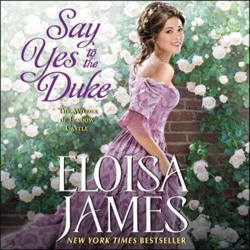
→ As an Amazon Associate I earn from qualifying purchases. I also may use affiliate links elsewhere in my site.


